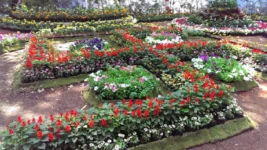
Pune to Open New Botanical Garden Showcasing Over 400 Indigenous Plant Species
The Botanical Survey of India’s (BSI) Western Regional Centre in Pune is preparing to unveil the ‘Mundhwa Botanical Garden,’ an expansive 44-acre project located in Mundhwa. This new garden is set to showcase over 400 plant species indigenous to India, including 50 species unique to Maharashtra.
Conservation Focus
Researchers from BSI have noted that the Western Ghats, a rich biodiversity hotspot, is home to 4,900 plant species, of which 1,750 are endemic. Among these is the endangered Shiv Suman flower, a plant of significant historical importance to Maharashtra. The primary goal of the Mundhwa Botanical Garden is to counteract the decline of these species, which is exacerbated by increasing human interference and habitat destruction.
A. Benniamin, Scientist E and head of the BSI Western Regional Centre, emphasized the garden’s critical role in conserving species that might otherwise face extinction. In an interview with Times of India, Benniamin highlighted the garden’s potential to serve as a repository for endangered plants and a center for educational outreach.
Project Development
The project commenced in 2023, involving an extensive survey of the Western Ghats across Maharashtra, Karnataka, and Goa. During this survey, researchers collected seeds from a variety of endemic plants. These seeds were cultivated in a lab, sprouted into saplings, and are now being planted in the new garden.
Featured Plant Species
In addition to Maharashtra’s endemic flora, the Mundhwa Botanical Garden will also include:
- From Karnataka:
- Endangered Nutmeg (Myristica magnifica Bedd.)
- Blistering Varnish Tree (Holigarna grahamii (Wight) Kurz)
- Blackboard Tree (Alstonia venenata R. Br.)
- Other Notable Species:
- Wild Nutmeg (Kmema attenuata Warb.), endemic to India
- Syzygium stockssi (Duthie) Gamble, native to southern and western India
Important Points to Note:
- Garden Focus: The Mundhwa Botanical Garden will feature over 400 plant species indigenous to India, including 50 species exclusive to Maharashtra.
- Conservation Efforts: The garden aims to address the decline of endemic plant species caused by human interference.
- Research and Development: Seeds from endemic plants were collected, cultivated, and planted in the garden as part of a detailed research project.
- Featured Species: The garden will include notable plants from Maharashtra and neighboring regions, contributing to broader conservation and educational goals.
The Mundhwa Botanical Garden promises to be a significant addition to Pune’s green spaces, offering both a sanctuary for endangered species and a valuable resource for botanical research and public education.



